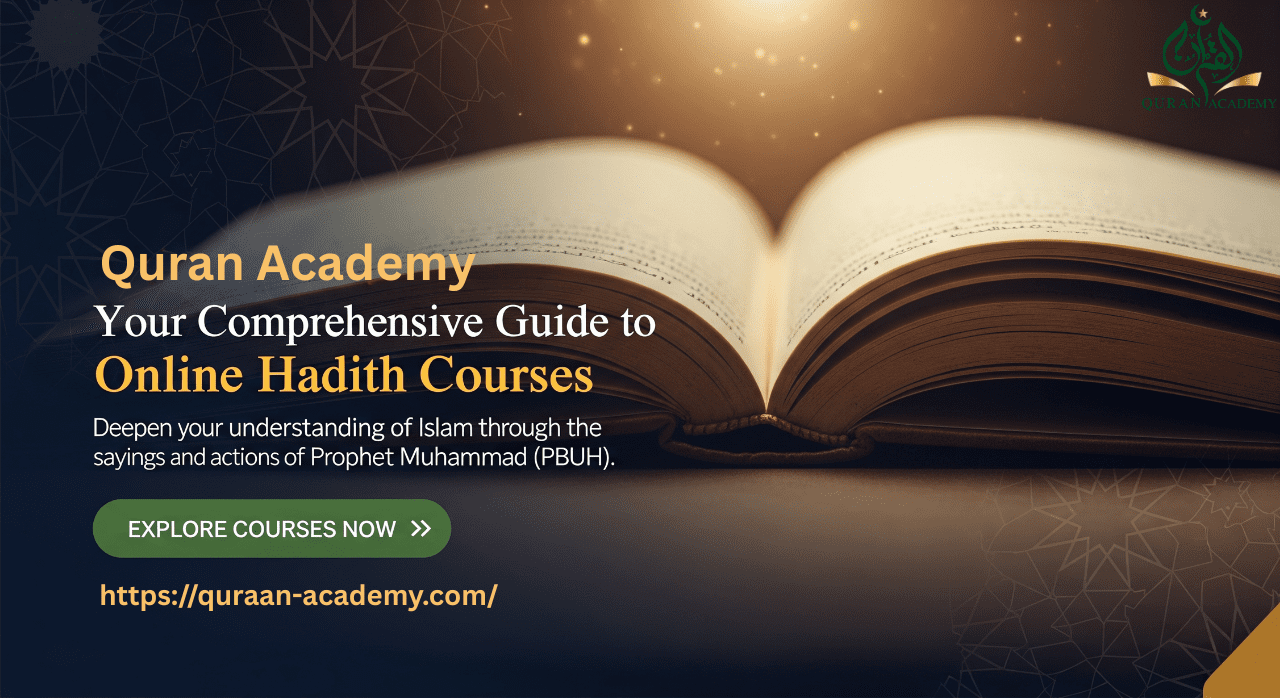An “Online Hadith Course” is an educational program delivered over the internet, designed to teach and study the noble Hadith of Prophet Muhammad (peace be upon him). Hadith refers to the sayings, actions, and approvals of the Prophet, and they are considered a crucial source of Islamic law and guidance after the Quran.
These courses are offered by educational institutions or Islamic academies, providing students the flexibility to learn from anywhere at any time. They often cater to various levels (beginner, intermediate, advanced) and are available in multiple languages. Course content may include live sessions, pre-recorded lectures, educational materials (such as PDFs and notes), quizzes, assignments, and may offer certificates upon completion.
What to Look For in an Online Hadith Course:
- Levels:
- Beginner: Often focuses on basic Hadith terminology, selected short Hadith with explanations, and the importance of Hadith in Islam. You might not need prior Arabic knowledge for these.
- Intermediate: Delves deeper into the sciences of Hadith (Ulum al-Hadith), such as classifications (Sahih, Hasan, Da’if), the chain of narration (Isnad), and famous Hadith collections. Some basic Arabic might be helpful here.
- Advanced: Explores critical analysis of Hadith, Ilm al-Rijal (study of narrators), comparative Hadith studies, and in-depth study of major Hadith collections like Sahih al-Bukhari or Sahih Muslim. Strong Arabic is often required.
- Language of Instruction: Many courses are in English, but you can also find them in Arabic, Urdu, and other languages. Some courses incorporate Arabic text with English explanations.
- Teachers: Look for courses taught by qualified scholars (Ulama) or instructors with degrees from reputable Islamic universities (like Al-Azhar, Madinah University, etc.).
- Course Structure:
- Live Sessions: Interactive classes with direct engagement with the instructor and other students.
- Pre-recorded Lectures: Flexibility to learn at your own pace.
- Materials: PDFs, notes, quizzes, assignments, and access to a learning management system.
- Certificates: Some programs offer certificates upon completion.
- Cost: Quran Academy offer free trial sessions. and you can see the program price from here: https://quraan-academy.com/pricing-of-courses/
- Focus: Some courses might focus on specific Hadith collections, specific topics (e.g., Hadith on manners, on prayer), or the methodology of Hadith (Mustalah al-Hadith).
How to Choose the Right Course:
- Define your goals: Are you looking for a basic introduction, in-depth academic study, or something specific like memorization or practical application?
- Assess your current knowledge: Are you a complete beginner, or do you have some prior Islamic knowledge or Arabic language skills?
- Check the instructors’ credentials: Ensure they are qualified and reputable.
- Read reviews/testimonials: See what other students say about the course quality and effectiveness.
- Utilize free trials: Quran Academy offer free trial sessions, which is a great way to experience the teaching style and course content before committing.
General Features of Online Hadith Course at “Quran Academy” :
Quran Academy aim to provide comprehensive Islamic education online, and Hadith studies are a core component. Here’s what you can generally expect:
- Levels of Study:
- Foundational/Beginner: Often starts with the basics of Hadith, its importance in Islam, the difference between Hadith and Sunnah, and an introduction to famous Hadith collections. You might learn short, essential Hadith relevant to daily life and basic manners. Arabic knowledge might not be a prerequisite at this stage.
- Intermediate: Delves into the Ulum al-Hadith (Sciences of Hadith). This includes:
- Terminology of Hadith: Understanding terms like Sahih, Hasan, Da’if, Mawdu’, Musnad, Mursal, etc.
- Methodology of Hadith Criticism: How scholars authenticated Hadith.
- Introduction to Major Hadith Collections: Sahih al-Bukhari, Sahih Muslim, Sunan Abi Dawud, Jami` at-Tirmidhi, Sunan an-Nasa’i, Sunan Ibn Majah (The Six Books of Hadith – Kutub al-Sittah).
- Selected Hadith Studies: In-depth study of specific Hadith, often from collections like Riyad as-Salihin or An-Nawawi’s Forty Hadith, with detailed explanations and practical lessons.
- Advanced: For serious students, this might involve:
- Ilm al-Rijal (Biographical Evaluation of Narrators): Studying the lives and reliability of Hadith narrators.
- Takhrij al-Hadith: Tracing Hadith back to their original sources.
- In-depth Study of Major Collections: Going through entire books like Sahih al-Bukhari or parts of them, with commentary.
- Ijazah Programs: Some academies offer Ijazah (authorized license to transmit) for certain Hadith collections, signifying a high level of mastery. This usually requires strong Arabic and direct interaction with a qualified scholar.
- Curriculum Focus:
- Understanding Hadith Context: Learning the historical and social context in which Hadith were narrated.
- Practical Application: Emphasizing how to apply the teachings of Hadith in modern life.
- Hadith Authenticity: Developing an understanding of how to differentiate authentic Hadith from weak or fabricated ones.
- Connection to Quran: Highlighting how Hadith complement and explain the Quran.
- Teaching Methodology:
- Qualified Instructors: Look for academies that emphasize certified teachers, often graduates from reputable Islamic universities (like Al-Azhar in Egypt).
- One-on-One Live Sessions: Quran Academy offer personalized classes via platforms like Zoom or Skype, allowing direct interaction and tailored learning.
- Interactive Learning: Utilizing digital whiteboards, screen sharing, and audio/video for an engaging experience.
- Flexible Timings: Classes often available 24/7 to accommodate students in different time zones.
- Learning Materials: Providing notes, summaries, and access to digital resources.
- Language:
- Most courses are taught in English, especially for non-Arabic speakers.
- However, the actual Hadith texts will be in Arabic, and understanding basic Quranic Arabic is often recommended or required for intermediate and advanced levels. Quran Academy offer separate Arabic language courses.
Online Hadith Course program and lessons
Here’s a detailed breakdown of common programs and the types of lessons within them:
Typical Online Hadith Course Programs (by Level):
Most reputable online academies categorize their Hadith courses into distinct levels to cater to varying student backgrounds:
- Beginner / Foundational Level:
- Goal: To introduce students to the importance of Hadith, basic terminology, and selected fundamental Hadith.
- Target Audience: Those with little to no prior knowledge of Hadith, including non-Arabic speakers.
- Program Name Examples: “Introduction to Hadith,” “Essential Hadith for Daily Life,” “An-Nawawi’s 40 Hadith (Simplified).”
- Intermediate Level:
- Goal: To deepen understanding of Hadith sciences (Ulum al-Hadith), introduce major Hadith collections, and develop a more critical approach.
- Target Audience: Students with a basic understanding of Islam, some familiarity with Hadith concepts, and sometimes basic Arabic.
- Program Name Examples: “Sciences of Hadith (Mustalah al-Hadith),” “Selected Chapters from Sahih al-Bukhari/Muslim,” “Riyad as-Salihin Study.”
- Advanced / Specialized Level:
- Goal: To provide in-depth scholarly study, critical analysis, and specialized knowledge of Hadith, potentially leading to Ijazah (licensing) in certain texts.
- Target Audience: Serious students of knowledge, those aspiring to become scholars, or those with strong Arabic language skills and a solid foundation in Islamic studies.
- Program Name Examples: “Comprehensive Study of Sahih al-Bukhari,” “Ilm al-Rijal (Study of Narrators),” “Takhrij al-Hadith,” “Hadith Criticism and Methodology.”
Common Lessons and Topics within Hadith Programs:
Regardless of the program level, certain core topics and specific Hadith texts are frequently covered.
- Introduction and Fundamentals (Beginner Level Focus):
- What is Hadith and Sunnah?
- Definitions, differences, and relationship.
- The authority of the Sunnah in Islam.
- Importance of Hadith:
- Role of Hadith as a source of Islamic law (Sharia).
- How Hadith explains and clarifies the Quran.
- The Prophet’s role as an exemplar (Uswah Hasanah).
- Basic Hadith Terminology:
- Matn (text of the Hadith), Isnad (chain of narrators), Sahabi (Companion), Tabi’i (Successor).
- Brief History of Hadith Preservation:
- How Hadith were preserved during the Prophet’s time and after.
- Early collection efforts.
- An-Nawawi’s Forty Hadith (Al-Arba’in an-Nawawiyyah):
- A very common starting point. Students often memorize these Hadith and study their meanings and practical applications. These Hadith cover fundamental aspects of Islam, belief, and character.
- Selected Hadith for Daily Life:
- Hadith related to cleanliness, prayer, manners, family, community, ethics, etc.
- Sciences of Hadith (Ulum al-Hadith / Mustalah al-Hadith) (Intermediate Level Focus):
- Detailed Classification of Hadith:
- Based on Chain of Narration (Isnad):
- Mutawatir (concurrent)
- Ahad (solitary): Mashhur (well-known), Aziz (rare), Gharib (strange)
- Based on Authenticity/Acceptability (Qabul or Radd):
- Sahih (authentic): Conditions for a Sahih Hadith.
- Hasan (good): Slightly lesser in authenticity than Sahih but still acceptable.
- Da’if (weak): Reasons for weakness (e.g., discontinuity in chain, unreliable narrator).
- Mawdu’ (fabricated): How to identify fabricated Hadith.
- Other Classifications: Marfu’, Mawquf, Maqtu’, Mursal, Munqati’, Mudallas, Shadhdh, Munkar, etc.
- Based on Chain of Narration (Isnad):
- Study of Narrators (Ilm al-Rijal):
- Importance of knowing the narrators.
- Basic principles of Jarh wa Ta’dil (discrediting and accrediting narrators).
- Methods of Hadith Transmission (Ada’ al-Hadith):
- How Hadith were conveyed (e.g., Sama’, Qira’ah, Ijazah, Munawalah).
- Major Hadith Collections:
- Introduction to the Six Books (Kutub al-Sittah): Sahih al-Bukhari, Sahih Muslim, Sunan Abi Dawud, Jami` at-Tirmidhi, Sunan an-Nasa’i, Sunan Ibn Majah.
- Other important collections: Muwatta Malik, Musnad Ahmad, Sunan ad-Darimi, Sahih Ibn Khuzaymah, Sahih Ibn Hibban.
- Introduction to Hadith Commentaries:
- Brief overview of prominent commentaries on major Hadith books.
III. Advanced Study and Specialization (Advanced Level Focus):
- In-depth Study of Major Hadith Books:
- Going through complete chapters or books of Sahih al-Bukhari or Sahih Muslim, with detailed linguistic, jurisprudential, and contextual analysis.
- Ilm al-Rijal in Detail:
- Deep dive into biographical dictionaries and the criteria for evaluating narrators.
- Understanding the nuances of Jarh wa Ta’dil application.
- Takhrij al-Hadith:
- Learning the methodology of tracing a Hadith to its original sources and evaluating its authenticity based on different chains of narration.
- Hadith Criticism and Defense:
- Addressing misconceptions and criticisms leveled against Hadith.
- Understanding the scholarly responses to such criticisms.
- Applied Fiqh from Hadith:
- Extracting legal rulings and jurisprudential principles directly from Hadith texts.
- Ijazah Programs:
- For students who demonstrate mastery, an Ijazah (license to transmit Hadith) may be granted by a qualified scholar, often after rigorous examination and direct study of specific texts.
Learning Environment & Resources:
- Live Online Classes: Via platforms like Zoom, Google Meet, or proprietary virtual classrooms.
- Recorded Sessions: For review or for students in different time zones.
- PDF Notes & Presentations: Supplementary materials.
- Quizzes & Assignments: To assess understanding.
- Online Discussion Forums: For student interaction and questions.
- Access to Digital Libraries: Sometimes providing access to Hadith databases or e-books.





Helped me a lot, just what I was looking for : D.